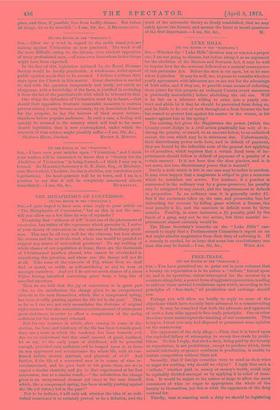LUKE HILLS.
[TO THE EDITOR OF THE "SPECTATOR."]
Srn,—Whether the " Luke Hills" decision was or was not a proper• one, I am not going to discuss, but before citing it as an argument for the abolition of the Masters and Servants Act, it may be well to inquire how far the sentence followed as a natural consequence of this particular Act. Before the shoe is cut open, let us be sure where it pinches. It may be well, too, to pause to consider whether• yearly agreements with labourers are or are not for the advantage of both sides, and if they are, to provide some means of enforcing them (since for this purpose an ordinary County-court summons is practically unavailable) before abolishing the old one. Will it be fair on a labourer willing to enter into a yearly con- tract and abide by it that he should be prevented from doing so, and be liable to be out of work throughout a frost because the law has ceased to protect him against his master in the winter, or his master against him in the spring?
The existing Act gives the Magistrates the power (which the• County-court Judge in a civil action practically has not) of re- ducing the penalty, or award, to an amount below, to an unlimited/ extent, the sum which may be in strictness due. Unfortunately, their discretionary power ends here, and in default of payment, they are bound by the inflexible scale of the general Act applying. to all penalties, which requires that a certain fixed term of im- prisonment should follow in default of payment of a penalty of a certain amount. Is it not here that the shoe pinches, and is it- not more, not less, discretionary power that is wanted?
Surely a scale which is fair in one case may be unfair in another.. It may even happen that a magistrate is obliged to give a sentence• which he considers too severe. For instance, if a poacher is summoned in the ordinary way by a game-preserver, his penalty may be mitigated to any extent, and the imprisonment in default in proportion. In an ordinary case it is generally under £1. But if the exciseman takes up the case, and prosecutes him for defrauding the revenue by killing game without a license, the least penalty is £5, and the sentence in default must be three months. • Possibly, in some instances, a £5 penalty, paid by the funds of a gang, may not be too severe, but three months' im- prisonment almost certainly would be.
The Home Secretary's remarks on the " Luke Hills " case• seemed to imply that a Parliamentary Committee's report on an- Act might absolve magistrates from their duty of enforcing it. If a remedy is needed, let us hope that some less revolutionary one
than this may be found.—I am, Sir, &c., WILD Ass.


































 Previous page
Previous page